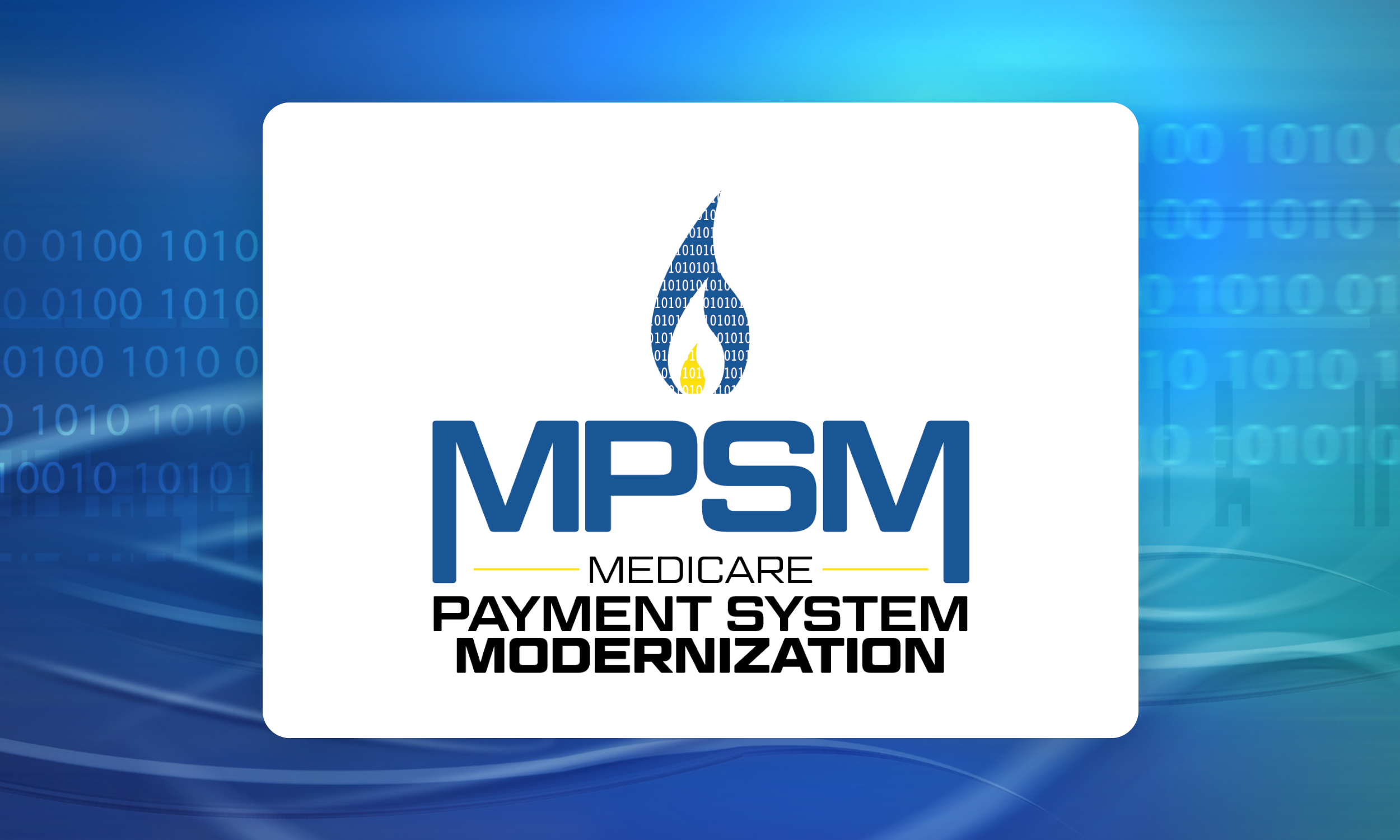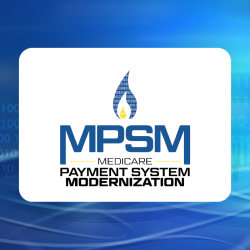MPSM Newsletter - May 2024

Program News
The Dental MVP is in Production!
The MPSM Program reached a huge milestone this spring when the Dental Teams deployed the Dental Minimum Viable Product (MVP) to Production! CMS is now ready to accept, process, and pay dental claims in the cloud!
On May 3, 2024, the Governance Board approved MPSM’s recommendation to proceed with publicly announcing the launch of dental system and to start accepting 837D dental claims. MACs will begin the process of finalizing registration materials for clearinghouses and beginning local provider outreach. MPSM is expecting to receive the first electronic 837D claims no later than July 1, 2024.
In the meantime, the dental teams are continuing to work on additional functionality. They are currently adding functionality to allow MACs to enter information from and process paper ADA claims. MACs will be able to manually input claims details and the application will provide acceptance or denial information to MACs and send data downstream to MCS to indicate that it is a paper claim.
Dental teams are also working on two other exciting priorities: developing the functionality to process adjustments beginning with claims that were denied and should be adjusted to be paid; and making initial claims data available for use by 1-800 MEDICARE and program integrity analysts. Both data customers rely on having access to comprehensive, accurate, and real-time updated claims data so this work will be very significant.
This is an exciting time for MPSM. The program has made significant strides, in a short amount of time.
Team Spotlight
MPSM is Having an Impact
Several MPSM Products and Services are already reducing the burden and improving efficiency for CMS stakeholders that utilize the FFS claims processing system. Highlighted below are some of the notable metrics the program has achieved so far.
Beneficiary (Bene) APIs
The Bene APIs provide real-time, 24/7 data availability to its users. Several different users leverage the beneficiary (bene) data made available through the three Bene APIs. Medicare Administrative Contractors (MACs) use bene data to accurately process Medicare claims. Medicare customer service representatives use the data to respond to customer support inquiries around payment or other concerns for Medicare claims. Some CMS researchers also use bene data.
By becoming the single source of truth for MACs and other CMS systems and making bene data more easily accessible, MPSM has improved the efficiency and accuracy of bene data for these users.
In 2023, the Bene API received approximately 10 million requests.
- Bene MSP API: ~20,000 hits per day
- Bene Crosswalk API: ~90,000 hits per day
- Bene Biographical API: ~70,000 hits per day
Replicated Data Access (RDA) API
The RDA API provides pre- and partially-adjudicated claims data to its users. The primary user of this data is the Data Analytics and Strategy Group (DASG) in the Office of Enterprise Data and Analytics (OEDA). DASG manages the Beneficiary FHIR Database (BFD) and the Beneficiary Claims Data API (BCDA). The BCDA provides data to downstream users like MACs, direct contracting entities, and Accountable Care Organizations (ACOs). The BCDA uses the RDA API to provide claims data to around 30 ACOs (DSAG hopes to grow the number of users to half of all entities, which would be hundreds). ACOs are healthcare entities that run value-based care arrangements that seek to reduce costs and improve beneficiary outcomes.
Approximately 10 million claims are streamed per day through the RDA API by providing pre- and partially- adjudicated claims data to these organizations almost two weeks faster than before, they have more information to coordinate care for their beneficiaries, manage risks, and ensure billing quality.
Leadership Spotlight
 "We Are MPSM" offers an opportunity to take a glimpse into leaders and product managers’ vision of MPSM, hear their views on the importance of modernization, and learn some fun facts about them along the way. The series continues with Brian Maher, MPSM’s new Technical Advisor and Transformation Lead.
"We Are MPSM" offers an opportunity to take a glimpse into leaders and product managers’ vision of MPSM, hear their views on the importance of modernization, and learn some fun facts about them along the way. The series continues with Brian Maher, MPSM’s new Technical Advisor and Transformation Lead.
WHO IS BRIAN MAHER?
In his new role as Technical Advisor and Transformation Lead for MPSM, Brian is passionate about uncovering better ways of working, improving collaboration between business partners, customers, and other stakeholders. He is having conversations with MPSM and DSSM staff to understand how we work and, in the spirit of continuous improvement, is always looking for new ways to think about the work that we do and how we can evolve incrementally.
WHAT IS THE SIGNIFICANCE OF MODERNIZATION FOR CMS?
“Modernizing software is an arduous journey that requires a transformation in people, process, and technology. Modernizing MPSM will create flexibility in both how we process claims and how we work, allowing us to quickly adapt to the changing world around us while continuing to meet the needs of the American people.”
YOUR CAREER IN 5 WORDS
“An extensive collection of badges!”
CAREER SNAPSHOT
“I joined CMS in December 2023. Prior to that, I worked in the private sector in many industries including healthcare, retail, higher education, and property casualty insurance. Most recently I was at Travelers Insurance helping them build and modernize software and adapt their ways of working to stay competitive in the property casualty industry.”
WHAT ARE YOU WORKING ON AT CMS?
“I’m still just trying to understand “how we work”. My eventual goal is to reduce friction in how we work, making it as easy as possible for everyone to do their best work.”
TELL US A FUN FACT ABOUT YOU
“I spent time in Rwanda rebuilding a technology center where students could take college courses online. We were told kids who leave Rwanda for college rarely return. Leadership wanted to make it easier for them to attend college locally and then apply what they’ve learned locally.”
WHAT DO YOU DO IN YOUR FREE TIME?
“I enjoy golf and reading. My son and I usually play a 2-man scramble meaning it's us against the course, not each other. It’s a lot of fun!”
WHAT ARE YOU LOOKING FORWARD TO THIS YEAR?
“Taking my family of six on a cruise to the Bahamas in June!”
Research Spotlight
Coordination of Benefits: Post-MVP Considerations for Dental
Coordination of Benefits (CoB) is a process that happens when a beneficiary has one or more additional coverages, for example a group health plan, Medigap, Medicaid or other coverage. It ensures that both Medicare and its beneficiaries appropriately share payment responsibilities for every claim. CoB includes a range of diverse capabilities, such as sending or "crossing claims over" to other insurers and sharing data with other insurers via Coordination of Benefits Agreement (COBA).
The Strategic Design team conducted research to better understand the complexities involved in the CoB process. The study centers around the beneficiaries who benefit from these services and the kinds of coverages they have. Their intention was to provide MPSM with an effective framework to guide the prioritization of CoB functionalities into the new dental claims system post-MVP. Here are some key takeaways:
- Among the 57.7 million Medicare beneficiaries enrolled in traditional Medicare in 2020, most (91%) had some type of additional coverage. Therefore, most claims processed by the Medicare FFS claims processing systems have a secondary payer.
- The level of cost-sharing assistance provided by Medicare varies based on many factors, (e.g., the eligibility category of the beneficiary, whether they receive full of partial benefits, state of residence etc.)
- The initial release of the Dental claims payment system does not have automated CoB processes because components of the existing process, such as COBA, don't cover dental. This means, in cases where Medicare is the secondary payer, it falls to the provider or beneficiary to coordinate benefits by identifying insurers and submitting claims to them manually.
- Strat Design determined that CoB is most relevant in scenarios where Medicare is a primary payer, and it's in these scenarios, where MPSM will want to consider prioritizing CoB functionality in the dental payment system balancing the features that will impact the users most with the complexity of implementation.
Strat Design determined that, before a technical strategy can be developed, certain operational and policy questions such as, “Who assumes primary payment responsibility for dental services?” still need to be resolved. Furthermore, beneficiaries, providers, and plan administrators will require outreach and education to reduce confusion around provider enrollment, claim submission and billing requirements associated with Medicare cost sharing.
To view the final presentation click here: Coordination of Benefits Passcode: 0%Uc6S8z
Informational Resources
What else is planned for FY24 Q3? Check out the Product Reference Sheet!
The FY24 Q3 MPSM Quarterly Planning session was held during the week of April 8, 2024. Following each Quarterly Planning, the MPSM Product Reference Sheet (PRS) is created to provide a high-level summary of how the MPSM product teams are helping to modernize Medicare Payment Systems, along with their recent progress and what they have planned for the coming quarter.

